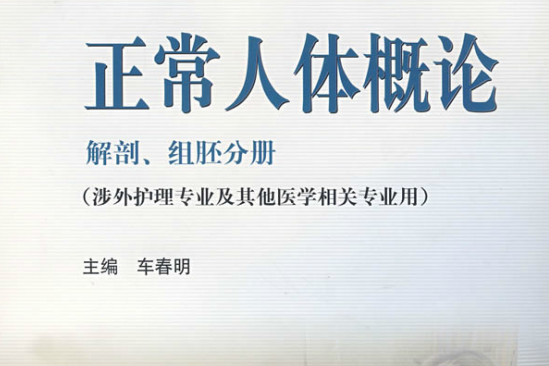《正常人體概論:解剖組胚分冊》是高等教育出版社出版的圖書,ISBN是7040174146。
基本介紹
- 中文名:正常人體概論:解剖組胚分冊
- 作者:車春明
- 出版社:高等教育出版社
- 出版時間:2005年8月1日
- 頁數:414 頁
- 定價:35.1 元
- 開本:16 開
- 裝幀:平裝
- ISBN:9787040174144
圖書目錄,內容簡介,
圖書目錄
Preface(緒論)
一、Definition of anatomy,histology and embryology(解剖學及組織胚胎學的定義)
二、Organization of the human body(人體的組成)
三、Frequently used terms in anatomy(解剖學常用術語)
四、Commonly used staining in histology(組織學常用的染色法)
五、Methods in studying anatomy,histology and embryology(學習解剖學及組織胚胎學的方法)
六、Review(複習)
第一章 Cell(細胞)
第一節 Cell Membrane(細胞膜)
一、Concept of the cell membrane(細胞膜的概念)
二、Chemical composition of the cell membrane(細胞膜的化學組成)
三、Structures of the biological membrane(生物膜的結構)
四、Function of the cell membrane(細胞膜的功能)
第二節 Cytoplasm(細胞質)
一、Cellular matrix(細胞基質)
二、Organelles(細胞器)
第三節 Nucleus(細胞核)
一、Nuclear membrane(核膜)
二、Nucleolus(核仁)
三、Chromatin and chromosome(染色質和染色體)
四、Nuclear matrix(核基質)
第四節 Cell Reproduction(細胞增殖)
一、Interphase(間期)
二、Mitotic stage(分裂期,M期)
第五節 Review(複習)
第二章 Basic Tissues(基本組織)
第一節 Epithelial Tissues(上皮組織)
一、Simple epithelia(單層上皮)
二、Stratified epithelia(復層上皮)
三、Glandular epithelia and glands(腺上皮和腺)
四、Special structures and junctions of the epithelial tissue(上皮組織的特殊結構和連線)
第二節 Connective Tissues(結締組織)
一、Connective tissue proper(固有結締組織)
二、Cartilage tissue and cartilage(軟骨組織與軟骨)
三、Osseous tissue and bone(骨組織與骨)
四、Blood(血液)
第三節 Muscle Tissues(肌組織)
一、Skeletal muscle(骨骼肌)
二、Cardiac muscle(心肌)
三、Smooth muscle(平滑肌)
第四節 Nervous Tissues(神經組織)
一、Neuron and neuroglia(神經元與神經膠質)
二、Nerve fibers(神經纖維)
三、Nerve endings(神經末梢)
第五節 Review(複習)
第三章 Locomotor System(運動系統)
第一節 Osteology(骨學)
一、Introduction(概述)
二、Bones of the trunk(軀幹骨)
三、Bones of the limbs(四肢骨)
四、Skull(顱骨)
第二節 Arthrology(骨連結)
一、Introduction(概述)
二、Articulations of bones of the trunk(軀幹骨的連結)
三、Articulations of the limbs(四肢骨的連結)
四、Articulations of the cranial bones(顱骨的連結)
第三節 Myology(肌學)
一、Introduction(概述)
二、Muscles of the trunk(軀幹肌)
三、MOscles of the head and neck(頭頸肌)
四、Muscles of the limbs(四肢肌)
五、Muscular landmarks of the body(全身的肌性標誌)
第四節 Review(複習)
第四章 Digestive System(消化系統)
第一節 Introduction(概述)
一、Components of the digestive system(消化系統的組成)
二、Fundamental structures of the digestive tract(消化管的基本結構)
三、Reference lines of thorax and abdominal regions(胸部的標誌線和腹部分區)
第二節 Digestive Tract(消化管)
一、Oral cavity(口腔)
二、Pharynx(咽)
三、Esophagus(食管)
四、Stomach(胃)
五、Small intestine(小腸)
六、Large intestine(大腸)
第三節 Digestive Glands(消化腺)
一、Great salivary glands(大唾液腺)
二、Liver(肝)
三、Pancreas(胰)
第四節 Peritoneum(腹膜)
一、Abdominal cavity,peritoneum and peritoneal cavity(腹腔、腹膜與腹膜腔)
二、Relationships between the viscera and peritoneum(腹膜與臟器的關係)
三、Structures formed by the peritoneum(腹膜形成的結構)
第五節 Review(複習)
第五章 Respiratory System(呼吸系統)
第一節 Respiratory了ract(呼吸道)
一、Nose(鼻)
二、Larynx(喉)
三、Trachea and main bronchus(氣管與支氣管)
第二節 Lung(肺)
一、Location and shape of the lungs(肺的位置和形態)
二、Bronchi inside the lungs and lung segments(肺內支氣管和肺段)
三、Microstructure of the lungs(肺的微細結構)
第三節 Pleura and Mediastinum(胸膜與縱隔)
一、Pleura(胸膜)
二、Mediastinum(縱隔)
第四節 Review(複習)
第六章 Urinary System(泌尿系統)
第一節 Kidney(腎)
一、Location of the kidney(腎的位置)
二、Shape of the kidney(腎的形態)
三、Coverings of the kidney(腎的被膜)
四、Structures of the kidney(腎的結構)
第二節 Ureter(輸尿管)
第三節 Urinary Bladder(膀胱)
一、Shape of the urinary bladder(膀胱的形態)
二、Location and relations of the urinary bladder(膀胱的位置與毗鄰)
三、Internal structure of the urinary bladder(膀胱內面的結構)
第四節 Urethra(尿道)
第五節 Anatomical Features of Infant Urinary System(小兒泌尿系統的特點)
一、Higher position of the urinary bladder(膀胱的位置高)
二、Lower position of the kidney(腎的位置低)
第六節 Review(複習)
第七章 Reproductive System(生殖系統)
第一節 Male Reproductive Organs(男性生殖器)
一、Male internal genital organs(男性內生殖器)
二、Male external genital organs(男性外生殖器)
三、Male urethra(男性尿道)
第二節 Female Reproductive Organs(女性生殖器)
一、Female internal genital organs(女性內生殖器)
二、Female external genital organs(女性外生殖器)
第三節 Mamma or Female Breast(乳房)
一、Location and shape of the female breast(乳房的位置和形態)
二、Structures of the female breast(乳房的結構)
第四節 Perineum(會陰)
一、Muscles of the perineum(會陰肌)
二、Important structures of the perineum(會陰的重要結構)
第五節 Review(複習)
第八章 Vascular System(脈管系統)
第一節 Cardiovascular System(心血管系統)
一、Introduction(概述)
二、Heart(心)
三、Blood vessels(血管)
第二節 Lymphatic System(淋巴系統)
一、Lymph vessels(淋巴管道)
二、LNnph organs(淋巴器官)
第三節 Review(複習)
第九章 Sense Organs(感覺器官)
第一節 Visual Organ(視器)
一、Eyeball(眼球)
二、Accessory organs of the eye(眼副器)
三、Blood vessels of the eye(眼的血管)
第二節 Vestibulocochlear Organ(前庭蝸器)
一、External ear(外耳)
二、Middle ear(中耳)
三、Inner ear(內耳)
四、Conduction of the sound wave(聲波的傳導)
第三節 Skin(皮膚)
一、Structure of the skin(皮膚的結構)
二、Skin appendages(皮膚的附屬器)
第四節 Review(複習)
第十章 Endocrine System(內分泌系統)
第一節 Introduction(概述)
一、Comportents and functions of the endocrine system(內分泌系統的組成及功能)
二、CIassification of the hormones(激素的分類)
第二節 Thyroid Gland(甲狀腺)
一、Location and shape of the thyroid gland(甲狀腺的位置和形態)
二、Microstructure of the thyroid gland(甲狀腺的微細結構)
第三節 Parathyroid Glands(甲狀旁腺)
一、Location and shape of the parathyroid glands(甲狀旁腺的位置和形態)
二、Microstructure of the parathyroid glands(甲狀旁腺的微細結構)
第四節 Suprarenal(Adrenal)GIands(腎上腺)
一、Location and shape of the suprarenal glands(腎上腺的位置和形態)
二、Microstructure of the suprarenal glands(腎上腺的微細結構)
第五節 Pituitary Gland(垂體)
一、Location and shape of the pituitary gland(垂體的位置和形態)
二、Microstructure of the pituitary gland(垂體的微細結構)
第六節 Pineal Body(松果體)
第七節 Review(複習)
第十一章 Nervous System(神經系統)
第一節 Introduction(概述)
一、Division of the nervous system(神經系統的區分)
二、Active modes of the nervous system(神經系統的基本活動方式)
三、Frequently used terms in the nervous system(神經系統的常用術語)
第二節 Central Nervous System(中樞神經系統)
一、Spinal cord(脊髓)
二、Brain(腦)
三、Meninges and blood Vessels of the brain and spinal cord and circulation of the cerebrospinal fluid(腦和脊髓的被膜、血管及腦脊液循環)
四、Pathway of the nervous system(神經系統的傳導通路)
第三節 Peripheral Nervous System(周圍神經系統)
一、Spinal nerve(脊神經)
二、Cranial nerves(腦神經)
三、Visceral nerves(內臟神經)
第四節 Review(複習)
第十二章 Human Embryology(人體胚胎學)
第一節 Preface(緒論)
一、Rcsearch scope and development of the embryology(人體胚胎學的研究範疇與發展)
二、Status of the embryology in medicine and methods of studying the science(人體胚胎學在醫學中的地位與學習方法)
第二節 Dcvelopment of the Embryo and Early Growth(J~體胚胎髮生和早期發育)
一、Maturation of the germ cells(生殖細胞的成熟)
二、Early development of the embryo(胚胎的早期發育)
第三節 Formation and Differentiation of Three-layered Embryo(三胚層的形成及其分化)
一、Formation of three-layered embryo(三胚層的形成)
二、Embryogenesis and differentiation of three-layered embryo(胚體的形成與三胚層的分化)
三、Tissucs and organs differentiated from three-layered embryo(三胚層分化的組織和器官)
第四節 Fetal Membrane and Placenta(胎膜與胎盤)
一、Fetal membrane(胎膜)
二、Placenta(胎盤)
第五節 Estimation of the Fetal Age(胎齡的推算)
第六節 Twins,Muhiplets and Conjoined Twins(雙胎、多胎與聯體雙胎)
一、Twins(雙胎)
二、Multiplets(多胎)
三、Conjoined twins(聯體雙胎)
第七節 Malformation(畸形)
一、Malformation in digestive system(消化系統的畸形)
二、Malformation in urinary system(泌尿系統的畸形)
三、Malformation in genital system(生殖系統的畸形)
四、Malformation in locomotor system(運動系統的畸形)
五、Malformation in nervous system(神經系統的畸形)
第八節 Fetal Circulation and Changes after Birth(胎兒血液循環及其生後變化)
一、Fetal circulation(胎兒血液循環)
二、Changes of the fetal circulation after birth(胎兒血液循環出生後的變化)
Reference(參考文獻)
內容簡介
《正常人體概論:解剖組胚分冊(涉外護理專業及其他醫學相關專業用)》是一本中、英文混編的雙語教材。全書分十二章,講述人體各器官系統的形態結構及人體發生、發育的基本理論知識,每章節包括學習目標、正文、插入框、閱讀理解、小結和複習。全書各級標題全部採用中、英文對照形式。專業知識的選擇和取捨以高等職業教育特點為依據,內容描述簡潔易懂,層次分明,圖文並茂,設計新穎。每章節的基本內容用中文描述,保證學生對解剖組胚學專業知識的掌握,各章節中的學習目標、插入框、小結和課後練習均採用中、英文對照形式,每章後按出現先後順序附英文單詞和音標索引,既有利於教師備課、學生自學和雙語教學,又有利於學生專業外語水平的提升。是我國第一本針對五年制高職涉外護理專業的雙語教材。
《正常人體概論:解剖組胚分冊(涉外護理專業及其他醫學相關專業用)》主要供五年制涉外護理專業使用,也可供五年制護理、助產、檢驗、藥劑、衛生保健、康復、口腔工藝、影像技術等相關醫學專業使用。

